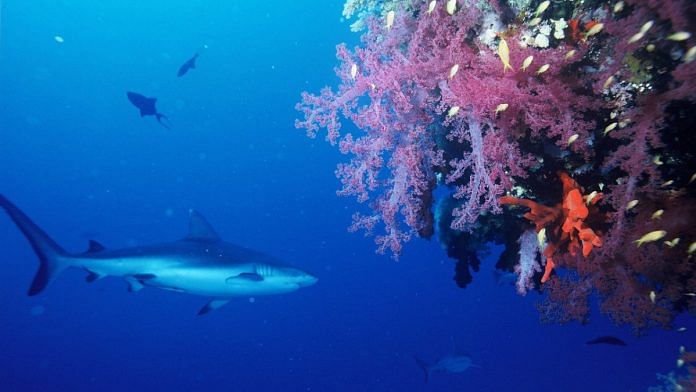New Delhi: Reef sharks, those found in coral reefs around the world, are disappearing — with the five most common species experiencing a decline of up to 73 per cent — a global survey has found. “Overfishing” is driving reef sharks towards extinction, said the study carried out by over 150 researchers, and published published in the Science journal last week.
Approximately one-third of all sharks, rays — a close relative of sharks — and related species are estimated to be threatened with extinction, according to reports, and the study highlights that as reef sharks began disappearing, rays started taking over.
The research is a result of a worldwide collaboration called the Global FinPrint project and was funded by the family foundation of Microsoft co-founder and ocean enthusiast Paul G. Allen.
It focused on five key species of reef sharks — the Caribbean reef shark, nurse shark, grey reef shark, blacktip reef shark and whitetip reef shark — by collecting and analysing 22,000 hours of video footage.
The study showed that the five species would qualify as endangered on The International Union for Conservation of Nature Red List of Threatened Species. The IUCN is the global authority on nature conservation.
“Our species-level analysis revealed global declines of 60 to 73% for five common resident reef shark species and that individual shark species were not detected at 34-47% of surveyed reefs,” the researchers wrote.
They added: “The direct and indirect effects of fishing have driven shifts in species composition from shark-dominated to ray-dominated assemblages and ultimately the complete loss of sharks and rays.”
However, with the right management techniques and measures to conserve the species, there is potential to turn around these numbers. The researchers said that population decline at a particular reef has little effect on reefs tens to hundreds of kilometers away. Thus, species can be protected by turning reefs into protected areas, it said.
In places such as the Philippines and Indonesia, the researchers noted that reef sharks are in a relatively healthy state compared to other areas, owing to programmes that actively manage them.
“Although direct management is critical, local and national socioeconomic factors that affect the ability of nations to develop, implement, and enforce regulations, and the likelihood that fishers comply with regulations, will be critical to maintaining or rebuilding populations,” they suggested.
Also read: Scientists find 1st known case of ‘virgin birth’ in crocodiles: 1 female, 14 eggs, no male partner
Extensive research, across 67 nations
Sharks are essential to the coral reef system and play an integral role in maintaining food webs, cycling nutrients, reducing disease, and helping regulate invasive species.
The researchers assessed 391 coral reefs across 67 nations — in the Indian Ocean off East Africa to Australia’s Great Barrier Reef to clusters of coral in the Caribbean. They used 22,756 baited remote underwater video stations (BRUVS), to make the observations. These are essentially underwater camera traps that consist of a small quantity of bait suspended in front of a camera.
In some parts, “absences were severe” as at 13.6 per cent of reefs, sharks were not detected at all, while at 21.5 per cent of reefs, no rays were found. Most of the losses were observed in Asia, eastern Africa, continental South America, and the central-eastern Caribbean. The grey reef shark saw the highest level of decline globally, according to the study.
(Edited by Smriti Sinha)
Also read: Hope for chikungunya vaccine: French drugmaker reports 99% immune response in Phase 3 trial



